IT’S THE DREAM OF MANY RESTAURANT OWNERS—start on the cheap in a marginal area, because that’s what you can afford, and grow with the neighborhood you help develop. Lula Cafe in Logan Square, Blackbird on Randolph, even Frontera Grill in what was once basically River North’s skid row—this is the side of gentrification everyone likes, hip restaurants as one of the key drivers of revitalization in our city.
Dan Salls was hoping to repeat that process when he opened the West Loop’s The Garage in a one-story former stable opposite Oprah Winfrey’s Harpo Studios in 2013, serving as a commissary for his The Salsa Truck, the first food truck to get a city license allowing it to cook on board, and also as a lunch counter taco joint for people living and working in the area. Three years ago, he was just about it around there for a modestly priced, chef-quality lunch. And the neighborhood did take off—faster than anyone imagined it would. Along the way, pricing Salls and other restaurant owners who gave it its flavor out.
On Friday the real estate site Curbed Chicago ran a story, promoted on social media by its sibling site Eater Chicago, that the building that houses The Garage was empty and for sale—claiming that Salls’ business has “shut down.” The broker has an interest in selling the site, not leasing it to an existing tenant, and so portrays the space as vacant and The Garage as defunct. But while Salls has removed his property, and put The Garage on hiatus pending alterations to the space at the same time that The Salsa Truck shut down for the winter, he also has a longterm lease agreement under consideration by his landlord. And there’s a certain amount of three-directional hardball being played over this particular location between broker, landlord and tenant, with media being part of where it’s getting played.
The Garage and The Salsa Truck are not dead—either they’ll sign a new lease on Aberdeen, or they’ll do all that in a different space. And Salls will also soon announce yet another business.
To reduce it to headlines, The Garage and The Salsa Truck aren’t dead, but one of two stories about them will soon be announced—either they’ll sign a new lease on Aberdeen and pour some investment money into the space, creating a new version of his business for how the neighborhood has evolved in just three years—or they’ll do all that somewhere else, in a different space. And Salls will also soon announce yet another business growing out of his love for Mexican food—a mescal-oriented bar and upscale Mexican street food restaurant.
But there’s far more to the story than those future headlines of places opening. Going inside the machinations that Salls has been dealing with over the last few years, as a pioneering food truck entrepreneur and now as a chef building community in the hot West Loop, tells you what’s really happening in our city when it comes to the intersection of small food businesses with dreams and big economic factors. I had two lengthy and thoughtful discussions with Dan Salls about this, one back in January and again this week as details have evolved, and this interview stitches together both occasions to tell his story.
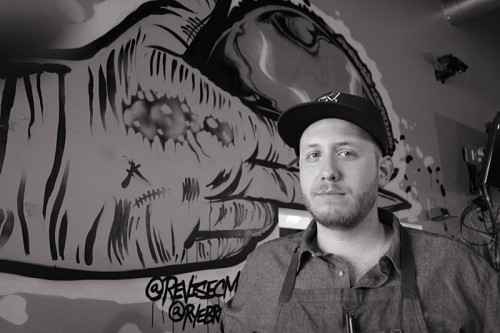
PART 1: THE SITUATION NOW
FOODITOR: Where does the situation stand now?
DAN SALLS: We have a lease offer in. I’ve gone back and forth with the guy for a year, there is a lease offer on his desk. After 25 back and forth counteroffers, we have met verbatim his ask. And he’s sitting on it…
Because he’s playing the field?
Yes. He’s playing the field. The place is finally a free agent, and I moved my stuff out because, I’m not going to continue to pay rent every month if you’re not going to tell me [if I’m staying]. I’m the only person that he says he’ll lease to, otherwise it’s a sell and teardown. He respects that we’ve been there four years and we want to put a couple of hundred thousand dollars into the place, get a liquor license and really make it great. I want a 10-year lease with a five-year option, and he won’t go past seven years, and he wants to cash out. He’s a freak about inflation and he’s absolutely certain that if I lock in a lease with him, even with standard 3-4% increases a year, he thinks inflation is going to go through the roof.
And the fact is, he’s been getting unsolicited offers for a million dollars, a million one, and he’s thinking about cashing out for the first time. Which is really unfortunate, because I’m at his mercy. I respect the fact that he had the foresight to buy the place 20, 30 years ago, but we had a good thing going, and I’m offering him a profit share, and he just won’t do it.
So, I have backup plans in the neighborhood, I have another project in the neighborhood that’s just about greenlit, that’s going to happen with or without The Garage.
And The Salsa Truck is not operating now?
Yeah, because I just don’t have a kitchen. First, because it was winter, and now because I don’t have a kitchen.
But the big blessing of this all is that for the first time in four years, I can sit down and go back to the business side of it, and fine-tune things, and plan for my future. I mean, I haven’t had a day off—I haven’t left the city in four years. So I’m like, sleeping in till 7 every day! So it’s nice that the pressure’s off, but I’m getting five emails a day saying hey, we want The Salsa Truck.
Oprah revitalized this area by putting her facility here, when it was really, you know, hookers and crack dens. And she absolutely destroyed it by selling it to that developer.
I’m just running around staging at friends’ restaurants, and secretly helping—I’m going to help open another couple of friends’ restaurants in the next month, starting with Kimski in Bridgeport. I’m just bouncing around. But it sucks, because the Tête Charcuterie guys got squeezed out. A lot of places are getting squeezed. It’s funny, Oprah revitalized this area by putting her facility here, when it was really, you know, hookers and crack dens. And she absolutely destroyed it by selling it to that developer for $38 million. Because everyone’s getting squeezed out.
And it’s too bad, because we’re getting tons and tons of, Hey, when are you gonna open back up. I sit there and I watch, we’ve been closed for two and a half months and I see people coming by every day trying to go to lunch. It’s heartbreaking.
But still, things are opening, Madison street is finally taking off with Monteverde—
And Fulton and Lake, there’s a couple of spots opening on Lake. I mean, I’ve toured every available space in the West Loop in the last few weeks, and it’s the pricing. I’ve looked and looked, and everything starts at fifty bucks a square foot. The only guys who can handle those kinds of prices are like Boka Group and One Off, or chains like Nando’s or Umami Burger, that kind of stuff.
Which just means it’s going to be a different kind of project. Much bigger—
It has to be. There’s no little guy left. It’s not the place for the little guy any more.
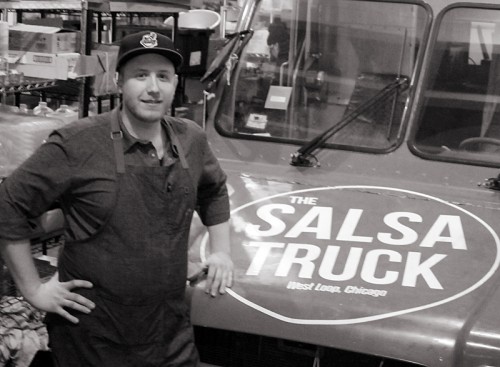
PART 2: LET’S START A FOOD TRUCK
Where did you come from, as a cook?
Nowhere.
Okay. So you were doing something entirely different when you decided to become a food truck guy?
I was, I was a career changer. I’d studied engineering in college, decided that wasn’t for me, and went into finance—I was a stockbroker for a huge bank. Not quite as glamorous as in Wolf of Wall Street, but doing the cold calls and client chasing and everything like that.
But I’d always loved to cook and eat, I always wanted to do something in that world. I’m only really cognizant of this now, but my father was involved with a couple of restaurants growing up, and I was always kind of around them.
So I quit my job, bought an ice cream truck with a million and a half miles on it, and signed the lease for The Garage all in the same day, in July 2012.
So what was the plan at that point?
The Salsa Truck. It was just an idea I couldn’t get out of my head. I love Mexican food, and I looked one day online to see if the vanity plate “SALSA” was available, and it was. Because the truck was a B truck title, the plate literally read “Salsa Truck,” so I said, all right, that’s it. The name fits and it’s a brand that we’ve created. Do I think it’s a little hokey? Of course. Do I want to be defined as the Salsa Truck guy? Well, it’s gotten me somewhere.
The food truck was my foot in the door, and when I was developing the food truck plan, I needed to find a commissary. We’re in version 3.0 of food trucks right now; there was version 1.0, which was the original food trucks [who could only sell pre-made food], and then there was version 2.0, which was myself and some of the early adopters of cook on board, who built our trucks a certain way, and now there’s 3.0, which is more of the classic California style with huge grills, and hood systems, and they can go for days on end. We’re more pick and pop, because we fought really hard to change the regulations to allows cook on board, but with that came a lot of regulatory caveats, how long you can park, where you can park, things like that.
So we built our truck to serve Chicago at the time. And it still works great at lunch, but it doesn’t work for the big three-day festivals and street fairs and things like that. But we’ve been around for a while, and we’ve built a nice catering business out of it—it’s worked out all right.
So why Mexican food?
I love Mexican food. And the Salsa Truck name worked, and the taco concept worked. But I’ve become truly passionate about it. You can go to a thousand different villages in Mexico, and talk to a thousand different grandmothers, and get a thousand different recipes for pozole. How can you call the national dish one thing, and have so many different answers? And that’s just so intriguing to me. I love the super-regionality of it, there’s multiple climates, multiple demographics. I’ve traveled to Mexico, before opening this and since, and I’m really obsessed with the regionality, the ingredients, the indigenous nature of it. I was talking with somebody about Cuban food the other day, and how Cuban food, or Afro-Caribe food, it’s very different—but each little island only has its once type. And I love Mexican because it has a thousand types.
I love Mexican food. You can go to a thousand different villages in Mexico, and talk to a thousand different grandmothers, and get a thousand different recipes for pozole.
And I’m a glutton for—well, I’m a glutton, but I’m a glutton for heat and spicy, and I’ve really developed my palate for chiles, I love every type of pepper you could ever find.
Why was it important to you to be the first truck that could cook on board in Chicago?
Well, we had to make sure it didn’t fall flat on its face, because there were a lot of other people trying to get food trucks out there. And more than anything, there was a stigma. It was a long, vocal fight—it’s amazing how people still don’t know you can cook on a food truck. “You have a food truck—cool, they lettin’ you cook on board yet?” Yeah, actually, for three years now.
It’s a responsibility because we have to go out there, we have to teach people that it’s good food, that it’s healthy, that it’s safe. We’re not roach coaches. We are held to the same if not a higher level of standard than conventional restaurants.
And I wanted to champion the city, too. We met in the middle—well, actually I met the city’s requirements that they laid out there, and we weren’t going to fight them on health standards of whether this should have a copper pipe or a plastic pipe. We met that burden and it was time to go out there and back it up. I’ve tried very very hard since the day we got that license to champion the food truck industry, to help as many other food truck drivers to run a commissary that houses other food trucks and businesses.
Well, speaking of commissaries, tell me about the thinking behind making The Garage not only your commissary but a restaurant, too.
I knew I wanted to be in the West Loop, I knew there was room for a lunch counter. There was strategy to this place being at Randolph and Aberdeen. It’s close to the Loop, we can get up and down Ashland or Halsted or the highway very easily. I found an empty garage—literally, a 160-year-old garage that used to be a horse stable for the fire department—and we built a professional kitchen in it.
The original plan was that we would build a lunch counter in here, and I would have a fleet of trucks. The Salsa Truck times ten, or The Salsa Truck, the Hummus Truck, the this truck and that truck. I think maybe two weeks of running The Salsa Truck and I was like, no more food trucks! We opened in January and it’s cold, and yes we had lines, but it’s just—it’s not for the faint of heart. I love it and we are battle-tested and I know the business better than anyone, but—it’s not a get rich quick scheme.
Community was the most important part with The Garage. I was a no-name, and we’ve garnered a lot of awards and made great food and done great collaborations, but basically, I used this restaurant to make it a community space. The other food trucks were able to offset our overhead.
But it was also a chance to have other food trucks collaborate with us, and then it became other chefs, and we’d do dinners, and lunches, and collaborate with other restaurants, from David Posey or Dana Cree at Blackbird to other food trucks, Lettuce Entertain You restaurants, we did a dinner with Nate Sears at The Radler—all of my friends that I’ve met. The cool thing for me, as someone who was self-taught, was that I’d have someone in my restaurant every day, and it was like staging in my own restaurant. I learned a lot of cool techniques, and met a lot of really interesting people, and we’re better for it after three years. And that’s kind of what this whole place has been about, the community of it, and the sharing.
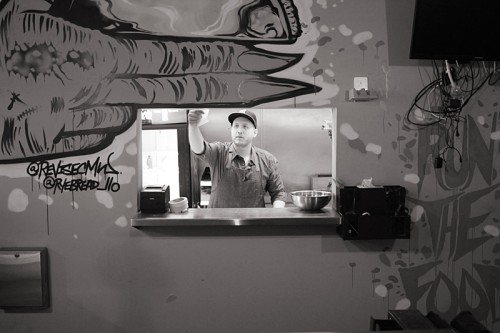
PART 3: THE BIG SHORT ORDER
How has the neighborhood changed since you started up here?
The neighborhood’s changed a lot. When we found this place four years ago and signed the lease, the neighborhood desperately needed a cheap lunch counter. The neighborhood was filled with a lot of creative types, a lot of ad agencies, art galleries, people came in looking eclectic, business casual. And now the neighborhood’s a little bit more suit and tie. The loss of Harpo has been huge, they were a big part of it, and I can only imagine what business would have been like with a line wrapped all the way around the block. I would have paid five times more rent.
But the thing is, the neighborhood’s getting more expensive. I bought a condo in this neighborhood and started a business here and I wanted to ride the boom out, so I can’t say I didn’t ask for it—but it’s changed. It’s changed quite a bit. The five services a week, ten dollar average ticket lunch counter doesn’t cut it as a business any more. But we want to keep the spirit of this place alive. We love what we do here, we think the community really likes what we do here, the daily changing menu would never go away.
There’s a bubble building, and it’s going to fall soon, and that’s why I’m getting squeezed now. Everyone’s trying to make their last penny before this ridiculous bubble bursts.
It means things like getting a liquor license—in the beginning we had our hands full and I didn’t really want to run a bar. But if it means it makes the bills a little easier to pay every month, then so be it. How do you capture more people in the morning? Maybe we put in a cafe here. It’s always been about multiple uses out of the space—we’ve taught classes here, we throw parties here, we have food truck rallies for charity, pig roasts—we do whatever we want. We’ve done a lot of cool stuff and we want to keep that spirit alive and the DIY nature and remain fiercely independent.
But the neighborhood’s changing a lot. There’s chains moving in from Nando’s Peri-Peri to Umami Burger, the west side of Randolph street and Ogden is starting to develop, and you see what’s happening at Halsted and Randolph. The chains are moving in, and they’re the ones that do the crazy market research and have teams behind them. It used to be that landlords could just ask an obscene amount of money and people would just snap at it, and take it. But the prices are getting ridiculous, and you can’t go up—the zoning doesn’t allow you to go up in the West Loop. It’s not like River North. So what do you do to stay alive? It’s an independent restaurant culture in this neighborhood, but the word’s out—it’s not a secret, the West Loop.
So do you feel that you’re being chased out of the West Loop?
Absolutely. Everybody was very welcoming in the beginning, and they still want us there—but the economics of it don’t work. Everyone’s talking about it, too—you meet with the brokers, you look at all these restaurant spaces, and everyone’s just like—this is stupid. There’s a bubble building, and it’s going to fall soon, and that’s why I’m getting squeezed now. Everyone’s trying to make their last penny before this ridiculous bubble bursts.
Do you think the bubble will really burst, or do you just think it’ll all be chain restaurants, the way, say, Lakeview is going right now?
That is the trend, and people will continue to pay these ridiculous prices. It seems like it’s all going that casual way, with the big money and volume and systems that can squeeze every last penny out so they can make it work.
A lot of people’s leases are coming up, the first leases on Randolph or the West Loop, and they’re about to hit their options, or their bubble payments that start going after the first five years. There’s a lot of turnover that’s about to happen in that area. Nobu’s going in, you talk to half the brokers and they’re like, “We’ve got two hotels, it’s the fastest growing zip code in the city, it should be $60 a square foot”—and then you talk to the real guys and they’re like, “This is fucked. This is so bad for everybody.”
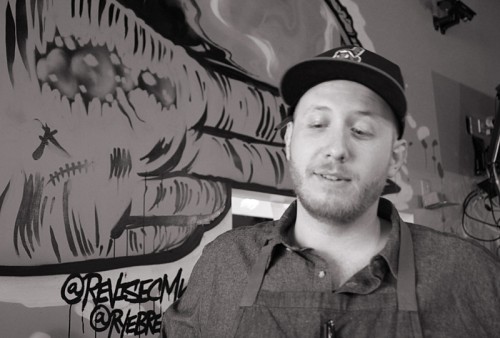
PART 4: NEGOTIATIONS
Warning: real estate math ahead
How did the building get listed?
]The landlord] hired a broker, who is an old friend of his. And then, at one point, I called his bluff and walked away. And he panicked and hired a broker. And it was like stupid Hollywood negotiating styles, in those two hours before I called him back again, he gave an exclusive to the guy. And the guy’s like, let’s jack it up! And then the landlord and I get a deal, away from the broker, and the broker’s like, well now there’s no money for me. So the broker says, we’re putting it up for $1.5 million.
Which is stupid. It’s a fast casual restaurant space. It needs at least a hundred grand of work to turn it into anything other than a fast casual restaurant. And a fast casual restaurant can’t make money [in a space that cost] a million-five. So that’s $450,000 you have to come up with, and take out a loan on another $900,000, a million, and if you’re a strong restaurant you want to be at 6 to 8% occupancy of gross sales. You have to turn that into a $2.5 million [revenue] restaurant—and you just can’t do that in a fast casual format.
So then it’s like, so what do you do with this restaurant? You tear it down and put apartments in it. And the thing we’ve learned is, the Harpo studio rebuild—the front entrance isn’t going to be facing Aberdeen. We’re going to be at the ass end of the development, he doesn’t own any of the buildings adjacent to him. By code and by foundation he can’t go above two floors. So he’s got a nothing space, that only means something to me.
He owns it outright, and it was a triple-net lease we offered him with no obligations. We would pay him an absurd amount of money every month that would go straight into his pocket. He’s just holding us hostage.
So isn’t more logical at this point for you to hunt for another neighborhood?
Yeah, and I’ve got a place lined up in a different neighborhood, either way. And I’ve got a second space that I might put a letter of intent in, because I like the space a lot and they’re giving me a year to figure out what I want to do with it.
But we want to continue to serve lunch and do all the things that we’ve been doing for the last four years, and help out the neighborhood and do it for all the right reasons. I don’t want to just become some four million dollar a year, high volume restaurant.
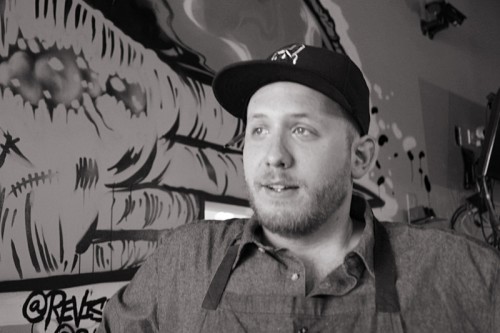
PART 5: THE FUTURE OF FOOD TRUCKS
So if you end up leaving your current location and doing these other concepts and locations, what does that mean—that you get to do this all over again in a new up-and-coming neighborhood?
Well, one would be on the outskirts of Logan Square/Humboldt Park area, a new up-and-comer. The other would be more of an established neighborhood.
What does this mean for The Salsa Truck?
I’m not going to operate it right now, just because I don’t have a commissary right now, so it becomes cumbersome. That draws us into a whole different conversation about how the city needs more commissaries, and the economics of food trucks are difficult, and they need to open up the 200-foot rule [for how close trucks can be to an existing restaurant]. Running a food truck in Chicago is damn near impossible if you don’t have a couple of tricks up your sleeve, like your own commissary, or somebody who’s willing to stay up all night and park your truck.
We still get invited to festivals, and I’m keeping the brand alive. It’ll come back, but honestly, if I start doing a food truck again in Chicago, we’ll probably build a new one. Because you’ve got to be able to go all day long. The daily lunch thing is nice, but it’s too competitive, and the weather sucks—six months of the year you lose the weather, and you only get Monday through Friday, and then you’ve got to get a parking space and you can only be there for two hours.
Going all day at street fests is way more lucrative, because you get to go for three days—you can do a whole weekend for five to ten grand a day, as opposed to doing four grand for the whole week. That’s what makes your summer. I would keep the current one for catering events, and then build a big one and drive around the country.
So you’d do, say, Milwaukee and Madison and places like that?
Well, it becomes cumbersome driving these trucks around. And every municipality has its own regulations and fees. The nice thing about Chicago’s being so difficult is that once you’ve passed it, you can pass anywhere! Where Chicago food trucks are really going to shine are these three-day festivals—because there’s no late night truck business. A guy comes out of the bar and wants one $3 taco, and I need a $10 minimum order just for it to be worth being out there.
There’s so many people who didn’t make it through the winter. They’re unloading all their equipment, their food trucks are for sale.
So that’s what we’d be working on—but the current Salsa Truck, there’s no way that thing can drive 15 miles outside the city. So we’ll keep the food truck going—it’d be a shame to lose the city’s first cook-on-board food truck. It’s sad, we have an Illinois Food Truck Owners’ Association, and there’s so many people who didn’t make it through the winter. They’re unloading all their equipment, their food trucks are for sale. It’s all these people who got bit by the bug and quit their jobs and put $100,000 into a business—and six months later they’re like, this was the worst decision of my life.
There’s more trucks being licensed—which is great, I’m not against that. But as long as we have parking restrictions, then the market’s going to be saturated. We’re just out of spaces. So then it’s going to turn into a powderkeg, and trucks start fighting for spaces, and bending the rules about how long they’ve been parked there. They’re only supposed to be parked there for two hours, but trucks are parking all night to get a space, they’re bending the rules, are they maintaining their health standards the whole time they’re sitting there?
All the food truck owners respect each other, because we all go through the same hell every day, but there are cliques within it—and my friend might do coffee and doughnuts in the morning, and he’s done by 11 every day, so we’ll coordinate exactly when he’s pulling out and I’ll pull right in. Well, sometimes a different clique doesn’t like that, and they’ll block you. It gets really petty—but these are people’s livelihoods. These are all people who quit their jobs to sell food on the street. They’re hungry.
The food truck scene is not great right now. So I’m going to take some time off from it. But I still want to keep what we did alive, I’m still going to be very involved with food trucks.
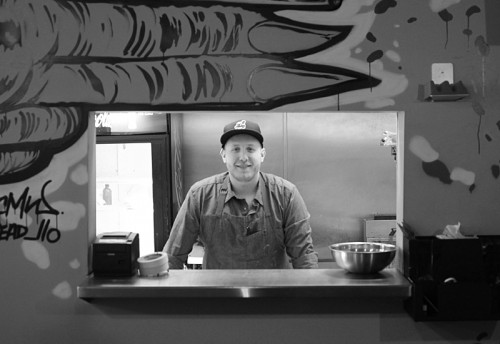
PART 6: WHAT WAS LEARNED
Tell me about your other next venture, the mescal bar.
We have a letter of intent out on an existing space that needs a little bit of work, it won’t be turnkey, but it will be quick. It’ll be more liquor-focused for sure, definitely a bar, with Mexican street food, really refined, but still just tacos. And by refined I mean, some of the same Salsa Truck flavors, but like handmade tortillas. Not fussy—nothing more than four bucks, but just a little bit nicer.
Mescal bars are trendy right now—great timing in Chicago right now, I’ve been planning this for a long time but so have the other people doing mescal bars. What we’re going to try to do that’s different is, we’re going to source a little bit differently. Part of what I’m going down to Mexico for is to get hooked up with a couple of mescalerias, we’re going to have our brand mescal, we’re going to try to get other spirits that aren’t just tequila and mescal made for us. We’re going to try to be a little more indigenous—I mean, I really like what Jay’s doing at Mezcaleria Las Flores, attached to Johnny’s Grill—but it’s an Irish diner! We want a mescal bar, with Oaxacan food.
So it’s that and then the other venture, either in the current space or somewhere else, will be The Garage, done right this time.
What was wrong about it the first time?
It was just piecemeal. I built it with my own hands, with no budget. The Garage was very—it never had a liquor license, and we could never get the seating situation right, and it was always full speed ahead because we were just figuring out the food business, and it was hard to commit to it as a restaurant. That’s what the new version will be.
It’s already broken my heart, so many times. Every day I wake up and my heart’s broken, from that place.
It sounds like in some ways you’ll be relieved if you finally have to commit to moving, and just start from scratch somewhere.
No, because I built that place myself—
It’ll break your heart—
It’s already broken my heart, so many times. Every day I wake up and my heart’s broken, from that place. And I’m missing that part of my life. I was married to that place, no doubt. It was a dysfunctional relationship at times. But I built it with my own hands, it was a very special place, it’s where I came into my own. It’s what gave me all my opportunities—so it’ll be awful.
Plus, I never got my investment back. There’s a hood in there, a black iron system, that I would love to not have to pay for a new one. And people were really starting to get it, and every day when I see people walk up, and we’re not open, it’s heartbreaking.
How do you avoid that happening in the next place, then?
One, sign a different lease—before I had to sign a short-term lease because I didn’t know if we were going to survive, and I was personally guaranteed. So now I know what I’m doing; I can afford to take my time to make sure it’s the right lease, to make sure I can get out of it if we need to, but that it’s long enough, at an appropriate economical rate. I’d rather be more on a lower lease and a profit share kind of thing. I want to become partner with my new landlord, not an adversary. That’s what this became.
I’ll still have to build up business again at The Garage, because that Randolph and Aberdeen corner is dead now, and it’s about to become a demolition zone. I used to get 40 to 50 people a day from Harpo, that slowly disappeared over the years but it was supplemented by other businesses in the neighborhood. Everyone’s like, just wait till Google. And then it opens and you find out they get free lunch every day, I haven’t seen one customer from Google.
But the neighborhood’s different now—before it was hipsters, and guys who didn’t have to get dressed up for work—a lot of ad types and creatives. Now it’s guys in suits, and real estate developers, and it’s not the same vibes any more.
But I still love the neighborhood. It gave me everything. We had to be there before, because we had to be in “the food neighborhood,” and logistically it made sense for the trucks. We needed to be there to establish ourselves as the small guy among all the big players. We’re still going to keep it true. Stay west of the highway. And I want to still be able to serve lunch in that neighborhood, that gave me the opportunity to have a food business. It’s not that we aren’t appreciative. Scraping and clawing to try to find a way to stay.
Michael Gebert is a small entrepreneur trying to fix up a neighborhood as editor of Fooditor.
Latest
Join the Discussion
After you comment, click Post. If you're not already logged in you will be asked to log in or register with Disqus.



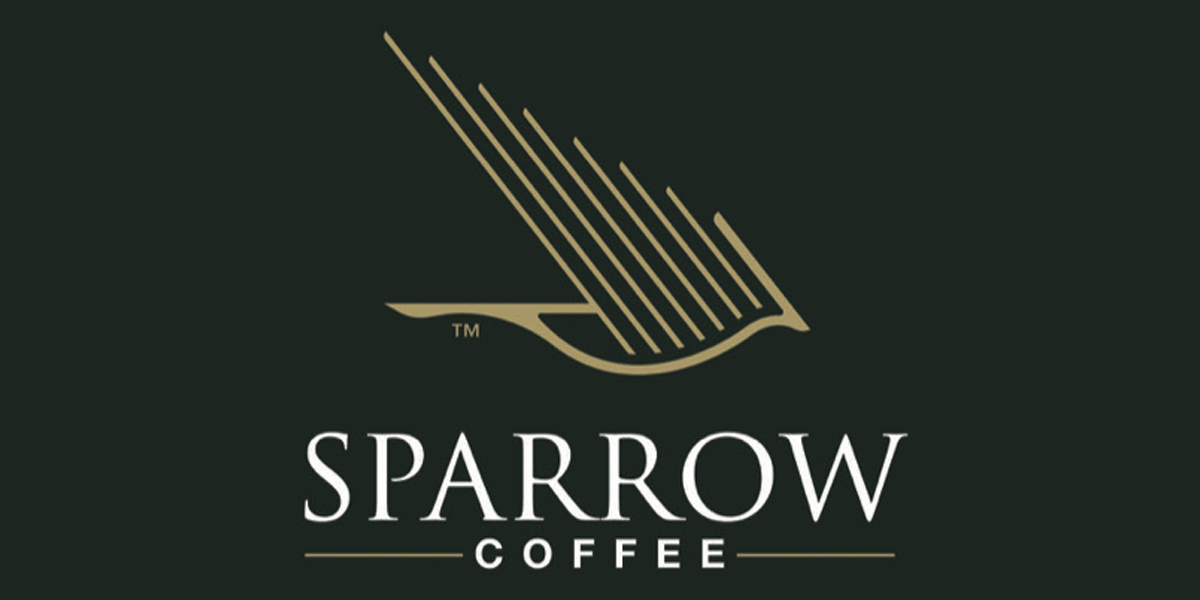
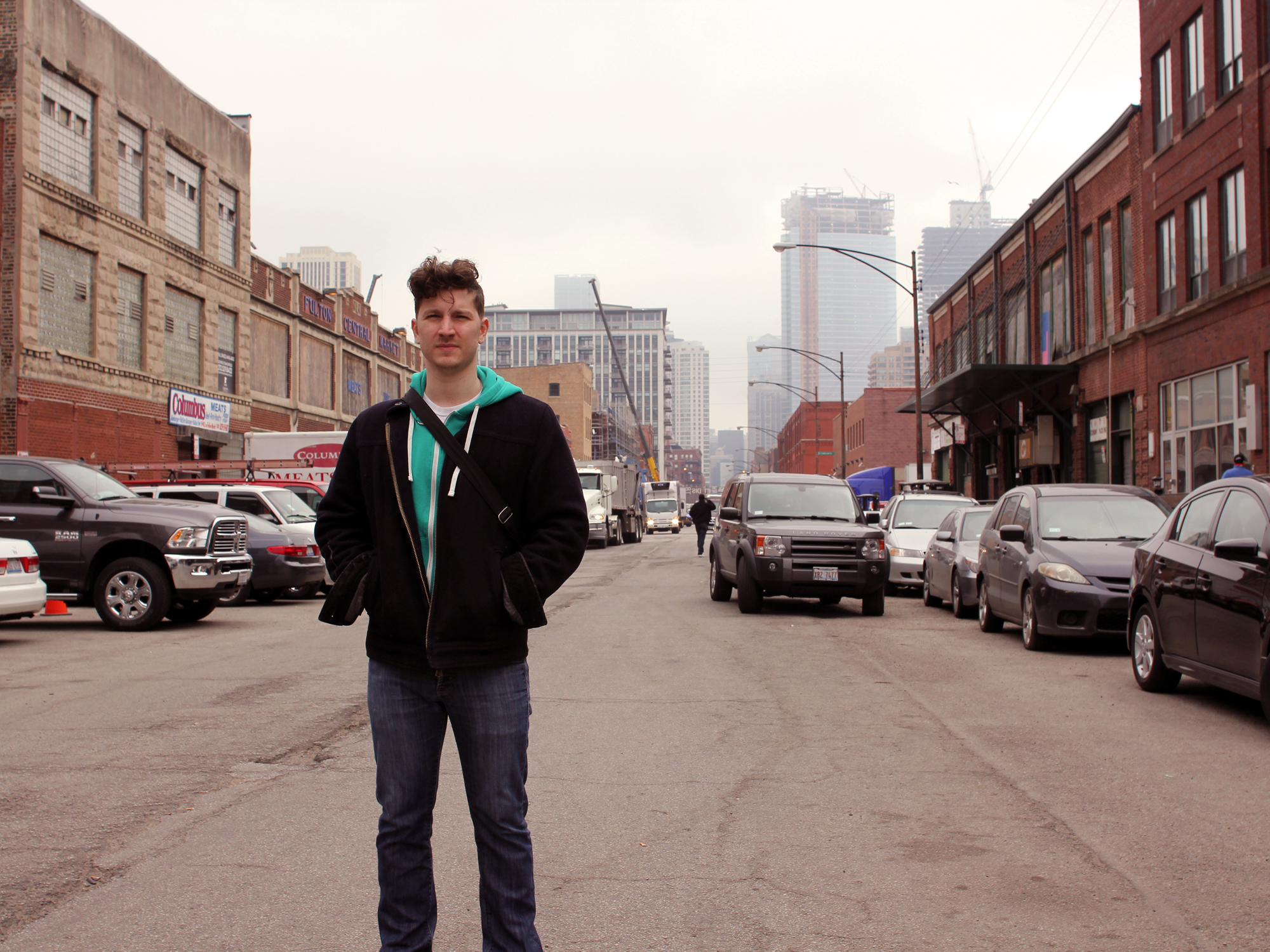
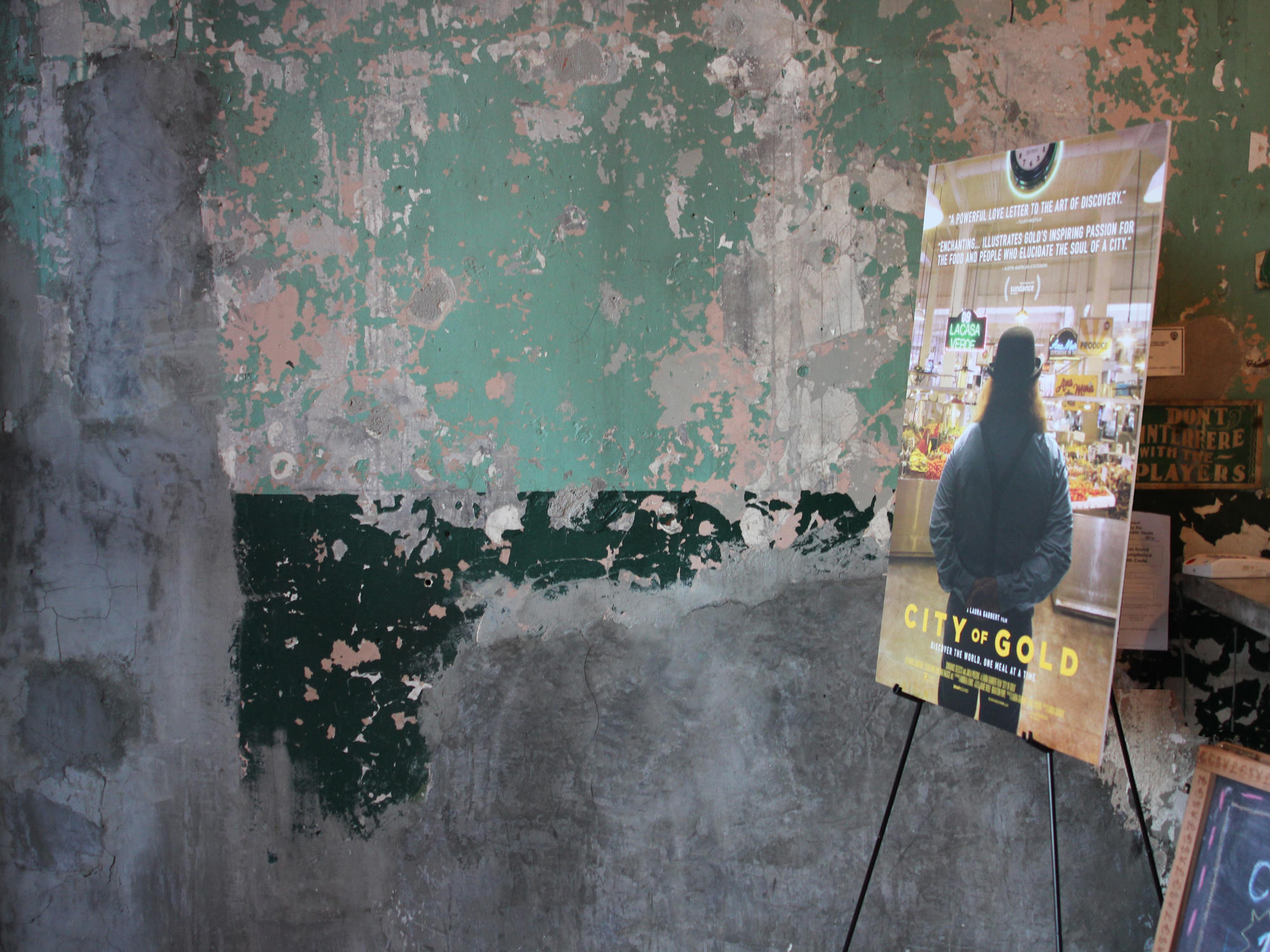
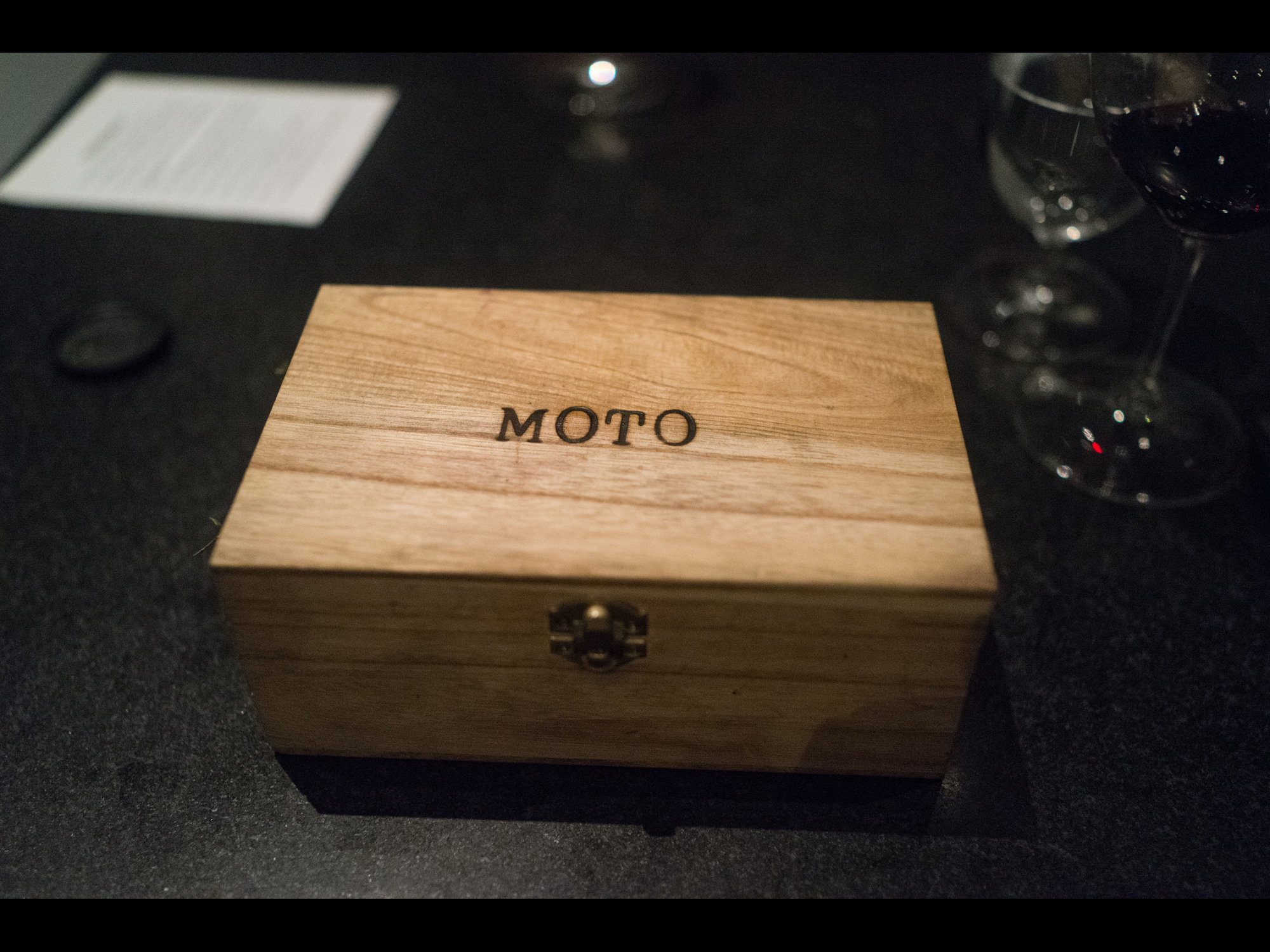
I liked The Garage a lot, and as a nearby resident I agree with or co-sign a lot that’s in this article.
But….
“And the neighborhood did take off—faster than anyone imagined it would.” Well, it may have taken off with real estate values, but for some reason, there still seems to be a lot of resistance to food places (or businesses of any kind) farther west of Morgan. The truly, profoundly amazing Tete Charcuterie closing as well as the Garage. There may a few bars on Madison, as well as Monteverde, but not a lot else to choose from unless you go to one end of Randolph or the other.
I think a few things are at work – the real estate values are part of it, but it’s also the friction between Restaurant Row and the residential area around it. Which audience do you serve as a restauranteur? Everyone’s chasing the Restaurant Row clientele, for obvious reasons, but there aren’t a lot of places for locals to eat after work. (I’m sure Au Cheval is magnificent, but no one wants to wait in line for 3 hours after being at work for 10.) I think there’s a sustainable niche here for a few audiences and it’s being missed. The WL is also missing a lot of those community space type places, where people can gather (big coffeehouses, a full bakery, etc.) and we’re seeing a lot of very narrowly programmed spaces.
The WL is unfortunately split into two territories between two aldermen, and until that changes I don’t see a change in this disconnect. I’m bummed the Garage hit some bumps with their realtor, and hope they land someplace that works for them.
Headlines write the click-check that stories try to cash. 🙂
[…] where Dan Salls, owner of The Garage and The Salsa Truck, just spent about six weeks. When Fooditor last talked to him about The Garage being chased out of the booming (maybe bubbling) West Loop, he was still […]